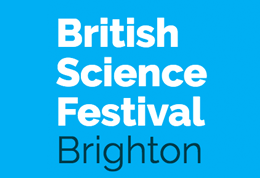6th Sep 2017
Multiple locations across the university

All booking details can be found here British Science Festival Brighton
Talk
Wed 6 Sep • 12:00 – 13:00
C122 • Checkland University of Brighton
Organised by: University College London
Suitable for: 16+
Gavin Hesketh gives an update on the latest from the Large Hadron Collider: the largest experiment ever built, studying the smallest things we know. By smashing subatomic particles together, we are learning more about the whole universe: what it is made of, how it behaves, and possibly even where it came from.
Talk
Wed 6 Sep • 14:00 – 15:00C218 • Checkland University of Brighton
Organised by: University of Brighton
Suitable for: 16+
Mega-tsunamis are thought to be generated by meteor impacts, as well as large-scale collapses of volcanic islands and are supposedly able to catastrophically affect distant shorelines. Phill Teasdale questions these ideas and the geological evidence for such events which suggests that the effects may be confined to regions much closer to the source.
Talk
Wed 6 Sep • 16:00 – 17:00
C122 Checkland University of Brighton
Organised by: University of Brighton
Suitable for: 16+
Everyone knows someone with a food allergy, and you may have one, but what exactly does it mean and why do they affect people differently? Join Tara Dean as she explores the important questions associated with food allergies and discover the recent advances in this commonly misunderstood area.
Talk
Wed 6 Sep • 10:00 – 11:00
The Keep University of Brighton
Organised by: University of Sussex
Suitable for: 16+
Rebecca Wright asks what lessons can be learnt from the Mass Observation Archive, a huge database that records everyday life in Britain. Explore whether knowledge of previous energy practices could provide novel solutions for managing energy consumption in the future.
Talk
Wed 6 Sep • 12:00 – 13:00
C218 • Checkland University of Brighton
Suitable for: 16+Exceptional performances tend to occur in exceptional circumstances, but people often mistake luck for skill when evaluating these outliers. This has led Chengwei Liu to argue that perhaps we should be rewarding second place. With evidence from the sporting world and business, Chengwei ponders that skill, in the face of luck, may not be all it’s cracked up to be.
Talk
Wed 6 Sep • 14:00 – 15:00
C122 • Checkland University of Brighton
Organised by: HarperCollins Publishers
Suitable for: 16+
Robert Hooke and Edmond Halley were pioneering scientists, but has their place in history has been overshadowed by the giant figure of Newton? John Gribbin argues that Newton was a liar and plagiarist who tried to write Hooke out of history, and without him, British science would have made a great leap forward in the second half of the 17th Century.
Wed 6 Sep • 16:00 – 17:00
C218 • Checkland University of Brighton
Organised by: University of Brighton
Suitable for: 16+
Explore how 19th century chemistry entered everyday life and culture in unexpected ways. Examine the untold history of nitrate mining in Chile’s Atacama Desert with Louise Purbrick and discover how its legacy is entwined with European markets and landscapes. Closer to home, Charlotte Nicklas will discuss how women engaged with chemistry and applied their knowledge to domestic cookery, medicine, and dyeing.